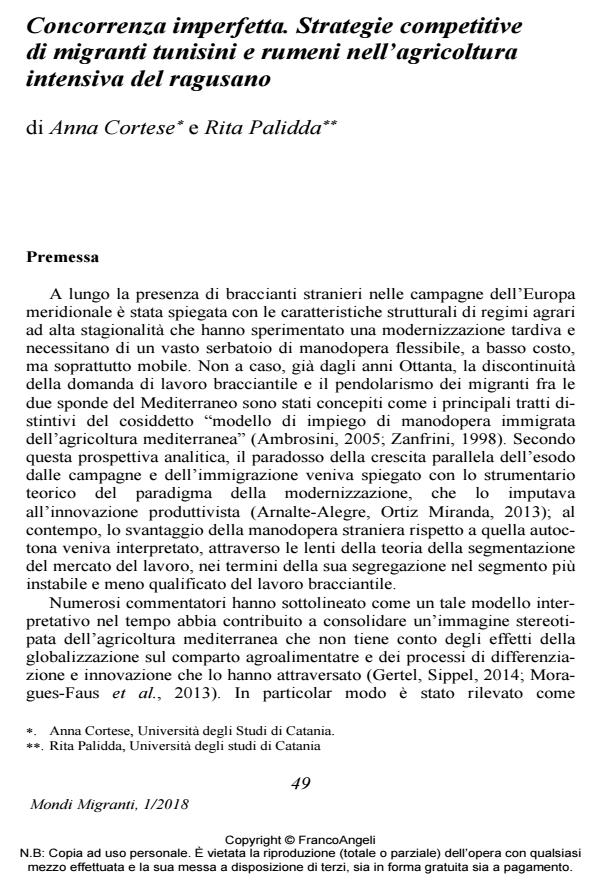Imperfect competition. Competitive strategies of Tunisian and Romanian migrants in the intensive farming of Ragusa
Journal title MONDI MIGRANTI
Author/s Anna Cortese, Rita Palidda
Publishing Year 2018 Issue 2018/1
Language Italian Pages 18 P. 49-66 File size 187 KB
DOI 10.3280/MM2018-001003
DOI is like a bar code for intellectual property: to have more infomation
click here
Below, you can see the article first page
If you want to buy this article in PDF format, you can do it, following the instructions to buy download credits

FrancoAngeli is member of Publishers International Linking Association, Inc (PILA), a not-for-profit association which run the CrossRef service enabling links to and from online scholarly content.
The social and employment integration of Tunisian and Romanian migrants in an intensive farming area of eastern Sicily has some peculiarities compared to the traditional "Mediterranean model" which is based on the structural link between the seasonality of activities and the mobility of migrants. The greenhouse cultivation loosens the functional imperative of mobility and increases the opportunities for continuity and regularity of the employment relationship for the migrants, but shifts the size of penalization on the side of the flexibility of the wage, the working time and the rate of production to different extents depending on the profiles and strategies of firms and workers. On the other hand, the civic stratification of migratory flows neither produced a generalized process of replacement of the Tunisian workers with the Romanian ones, nor guaranteed the newcomers better working and living conditions but, instead, contributed to institutionalize a mobile system of rules that regulate the labor market and reproduce inequalities between different groups of migrants. In particular, women, who experience a difficult balance between emancipation and well-being, suffer a more severe penalization, which extends to the experience of motherhood and the relationship with their children, but their role remains central to family strategies aimed at maximizing income and quality of life through an adaptation of the cultures and family models of the countries of origin to the constraints and resources of the host societies.
Keywords: Tunisian immigrants, Romanian immigrants, ethnic penalty, civic stratification, gender inequality, maternity.
- Migrant Farmworkers in 'Plastic Factories’ Valeria Piro, pp.21 (ISBN:978-3-030-74508-0)
- Immigrant Work and the Production of Italian Agrifood: The Variants of Subordinate Integration Maurizio Ambrosini, in Journal of Immigrant & Refugee Studies /2024 pp.1
DOI: 10.1080/15562948.2024.2424164 - Crisis and Post-Crisis in Rural Territories Alessandra Corrado, Giulio Iocco, Martina Lo Cascio, pp.73 (ISBN:978-3-030-50580-6)
- Languages of Discrimination and Racism in Twentieth-Century Italy Marcella Simoni, Davide Lombardo, pp.1 (ISBN:978-3-030-98656-8)
- Permanent Precarities: The Experience of Temporality of Tunisian Migrants in Sicily’s Transformed Agricultural Strip Andrea Calabretta, in Journal of International Migration and Integration /2025
DOI: 10.1007/s12134-025-01326-1 - Moral economy and deservingness in immigration policies. The case of regularisations in Italy Maurizio Ambrosini, in Ethnicities /2023 pp.306
DOI: 10.1177/14687968221117544 - Migrant Farmworkers in 'Plastic Factories’ Valeria Piro, pp.85 (ISBN:978-3-030-74508-0)
Anna Cortese, Rita Palidda, Concorrenza imperfetta. Strategie competitive di migranti tunisini e rumeni nell’agricoltura intensiva del ragusano in "MONDI MIGRANTI" 1/2018, pp 49-66, DOI: 10.3280/MM2018-001003